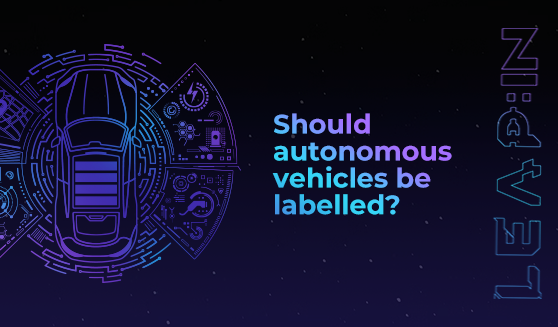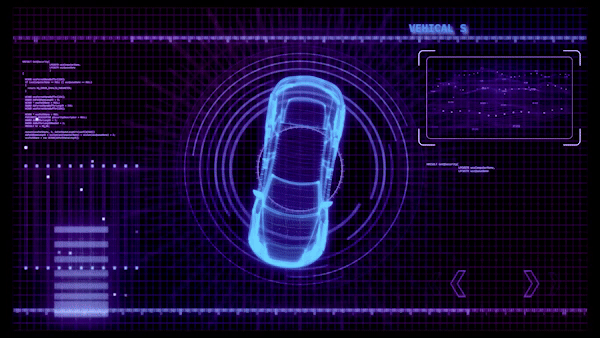

Should autonomous vehicles be labelled?

Welcome to the 1,013 new techies who have joined us since last Friday. If you haven’t already, subscribe and join our community in receiving weekly tech insights, updates, and interviews with industry experts straight to your inbox.
This week we’re quoting Helen Pan (General Manager at Baidu’s Apollo Open Platform)
What Pan said:
“Today's autonomous driving technology has crossed the watershed.”
What watershed?
The one between autonomous vehicles (AVs) being an imaginative, optimistic idea for the future, and actually become a reality of today.
“...both Waymo and Baidu have entered the stage of fully driverless commercial operations,” Pan added. And now they’re working to expand operations and reduce costs – moving towards the potential for all road users to have access to AVs.
In parts of the US, cars in full autonomous mode are already on the road. China, Japan, South Korea and Germany follow the US (in that order) in terms of numbers of autonomous vehicles on the roads. And in the UK, former transport secretary Mark Harper told the BBC that driverless cars could be in operation by 2026.

But how do people feel about autonomous vehicles?
Pan noted that in August 2023, “a think tank conducted research in multiple cities where autonomous vehicles are deployed, and over 80% of respondents expressed their desire for autonomous vehicles to expand to more venues.”
“This shows that autonomous driving services can satisfy the users,” she said.
So what does other research say?
- A 2021 study in South Australia found a gender gap among college students in terms of both knowledge about and feelings about AVs. Younger male students were more positive about AVs than female students.
- Another study in 2022 focused on university students in Alabama, US, found that young people are open to the prospect of new technologies, and indicated that the rollout of AVs may influence their travel behaviours.
- A 2022 study of even younger students (7th graders) found that anxiety towards AI was connected to negative feelings towards AVs. But many of the students also shared high expectations for the benefits AVs could have for themselves and wider society, which made them willing to support their rollout.
Last year in 2023, a public perceptions survey by the Institution of Mechanical Engineers found that:
- 70% of interviewees would feel uncomfortable travelling in an AV with no human control at all at 70mph, while 29% said they’d feel comfortable.
- 49% of drivers said they’d feel comfortable in the driving seat if they were able to take over full control of the vehicle when they wanted to.
- 34% said they wouldn’t let an AV that could both self-drive and be driven take over the task of driving, while 31% said they would let it take over if they felt tired, and 30% if they were unwell.
- 50% said full autonomous cars should be available to those with disabilities or health conditions which meant they were unable to drive.
- 39% said their biggest concern about travelling in a fully autonomous vehicle would be having no human control at all; while 29% said they were worried about the car’s ability to deal with external events.
- 25% suggested they believe AVs will be widely used on public roads in the UK between 2030 and 2040.
This particular study was in the UK only – and we know that the UK lags behind nations including other European countries, and the US and China, in terms of AV perception and acceptance.
Similar studies in the US and other countries where driverless cars are already in operation (like the study Pan mentioned) have come up with more positive results. Which suggests that perceptions will improve around the world as time goes on, and that real-life exposure to AVs improves people’s confidence in them.
Should AVs on the roads be labelled?
A number of studies around the world have found that the public want AVs to be labelled clearly – so drivers know when they’re sharing a road with an AV.
What do you think? Should AVs be labelled – and would that help public confidence? Open this newsletter on LinkedIn and tell us in the comments.
And we’ll see you at LEAP 2024 to explore the latest developments in AVs, and reimagine the future of transport together.

Have an idea for a topic you'd like us to cover? We're eager to hear it! Drop us a message and share your thoughts.
Catch you next week,
Richard McKeon
Group Marketing Director
P.S. - Mark your calendars for LEAP 2024 📅 4-7 March 2024. Want to be a part of the action?




Building inclusive AI: How better data can create fairer systems
Moving towards tech that works for everyone
Related
articles



Building inclusive AI: How better data can create fairer systems
Moving towards tech that works for everyone
